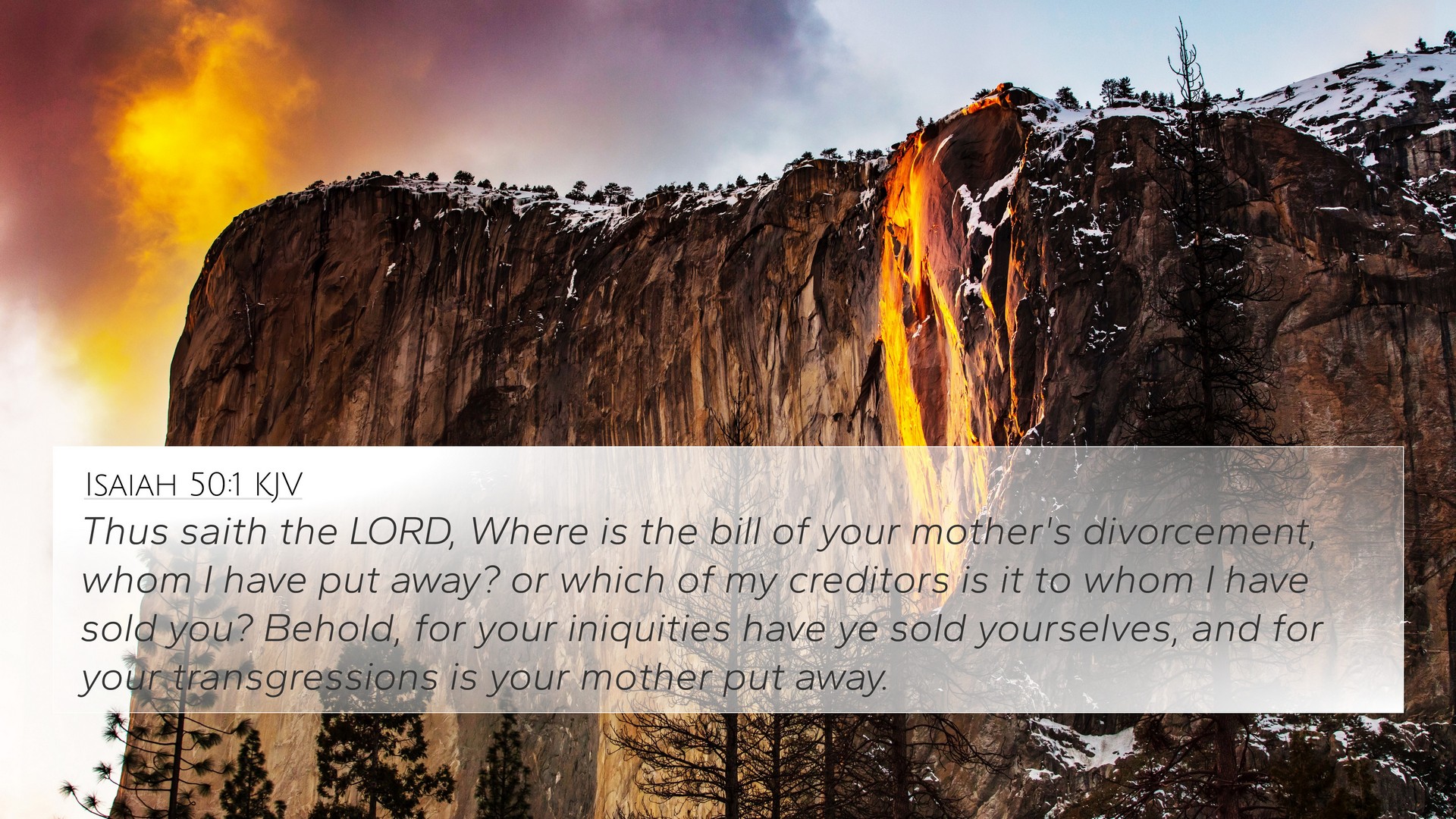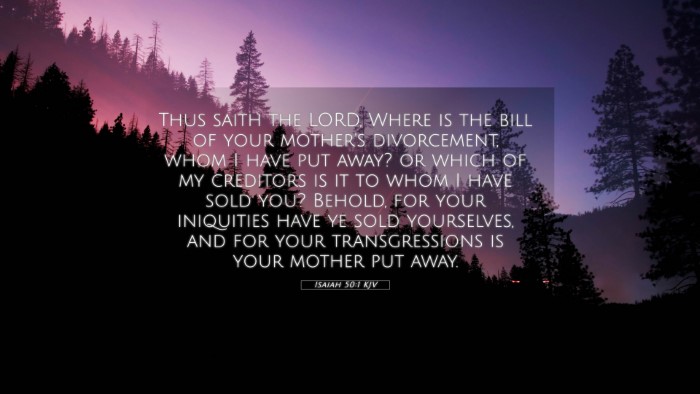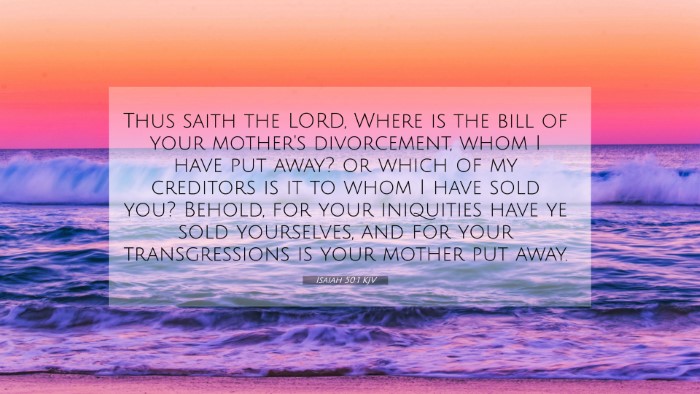This section features a detailed cross-reference designed to enrich your understanding of the Scriptures.
Below, you will find carefully selected verses that echo the themes and teachings related to Isaiah 50:1 KJV. Click on any image to explore detailed analyses of related Bible verses and uncover deeper theological insights.
 Deuteronomy 32:30 (KJV) »
Deuteronomy 32:30 (KJV) »
How should one chase a thousand, and two put ten thousand to flight, except their Rock had sold them, and the LORD had shut them up?
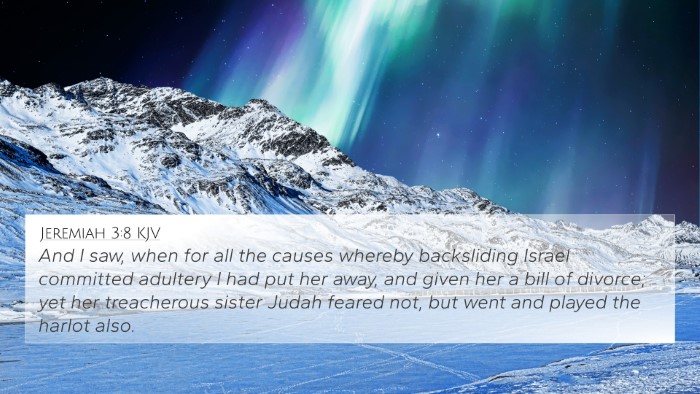 Jeremiah 3:8 (KJV) »
Jeremiah 3:8 (KJV) »
And I saw, when for all the causes whereby backsliding Israel committed adultery I had put her away, and given her a bill of divorce; yet her treacherous sister Judah feared not, but went and played the harlot also.
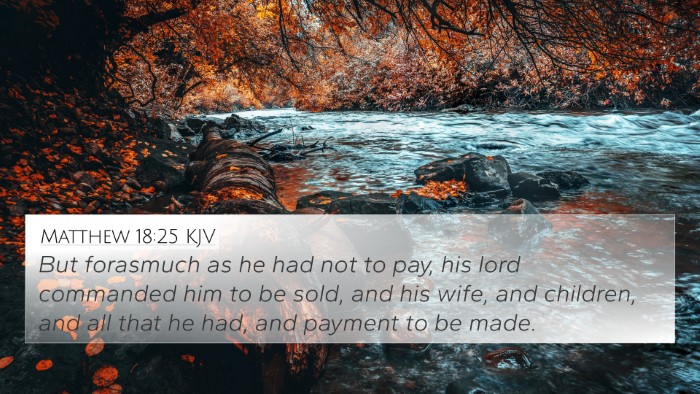 Matthew 18:25 (KJV) »
Matthew 18:25 (KJV) »
But forasmuch as he had not to pay, his lord commanded him to be sold, and his wife, and children, and all that he had, and payment to be made.
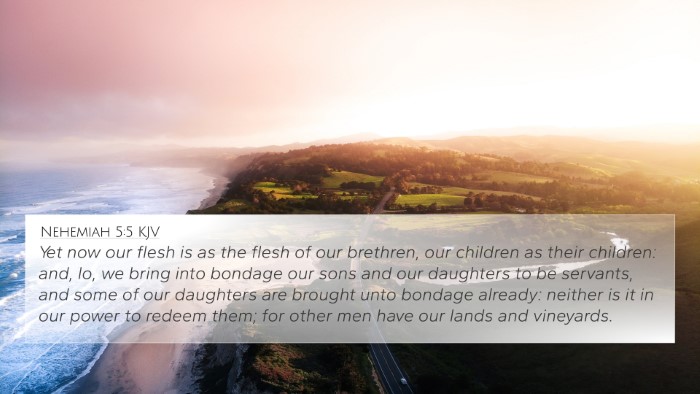 Nehemiah 5:5 (KJV) »
Nehemiah 5:5 (KJV) »
Yet now our flesh is as the flesh of our brethren, our children as their children: and, lo, we bring into bondage our sons and our daughters to be servants, and some of our daughters are brought unto bondage already: neither is it in our power to redeem them; for other men have our lands and vineyards.
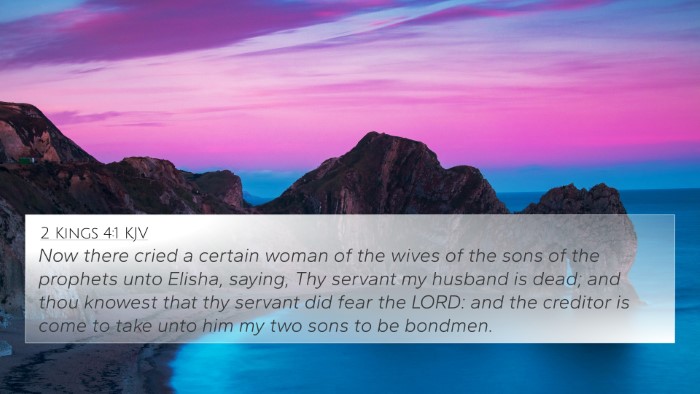 2 Kings 4:1 (KJV) »
2 Kings 4:1 (KJV) »
Now there cried a certain woman of the wives of the sons of the prophets unto Elisha, saying, Thy servant my husband is dead; and thou knowest that thy servant did fear the LORD: and the creditor is come to take unto him my two sons to be bondmen.
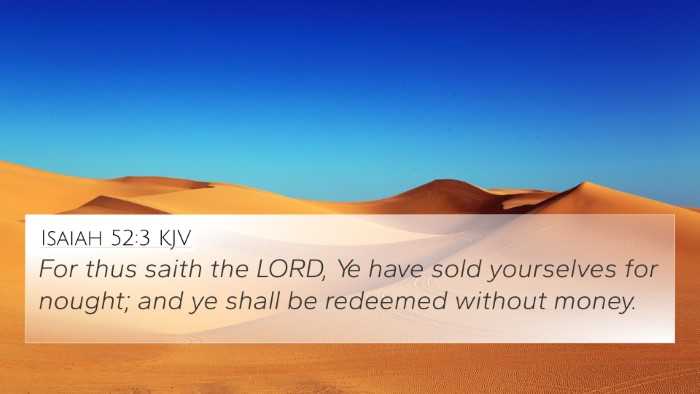 Isaiah 52:3 (KJV) »
Isaiah 52:3 (KJV) »
For thus saith the LORD, Ye have sold yourselves for nought; and ye shall be redeemed without money.
 Jeremiah 3:1 (KJV) »
Jeremiah 3:1 (KJV) »
They say, If a man put away his wife, and she go from him, and become another man's, shall he return unto her again? shall not that land be greatly polluted? but thou hast played the harlot with many lovers; yet return again to me, saith the LORD.
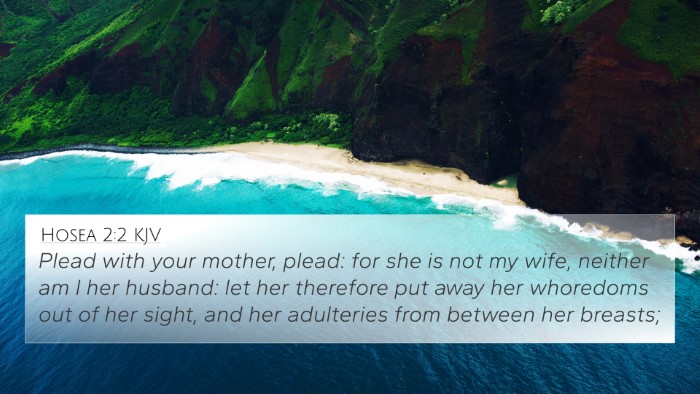 Hosea 2:2 (KJV) »
Hosea 2:2 (KJV) »
Plead with your mother, plead: for she is not my wife, neither am I her husband: let her therefore put away her whoredoms out of her sight, and her adulteries from between her breasts;
 Isaiah 59:1 (KJV) »
Isaiah 59:1 (KJV) »
Behold, the LORD's hand is not shortened, that it cannot save; neither his ear heavy, that it cannot hear:
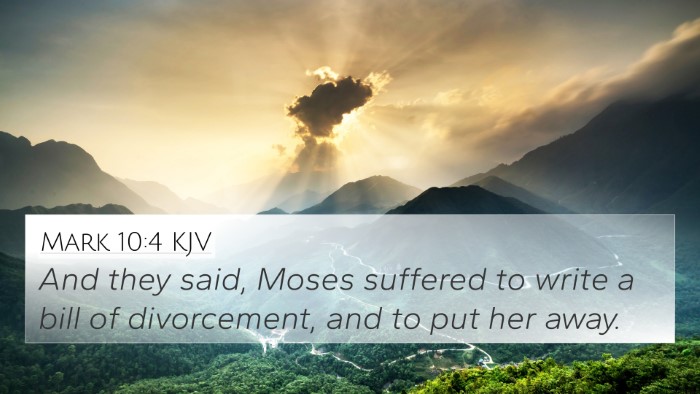 Mark 10:4 (KJV) »
Mark 10:4 (KJV) »
And they said, Moses suffered to write a bill of divorcement, and to put her away.
 Psalms 44:12 (KJV) »
Psalms 44:12 (KJV) »
Thou sellest thy people for nought, and dost not increase thy wealth by their price.
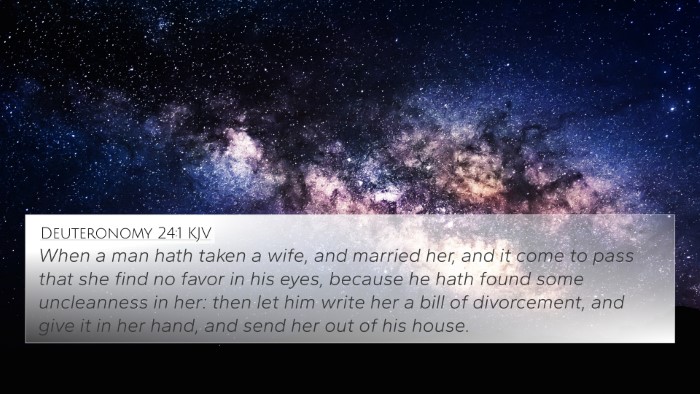 Deuteronomy 24:1 (KJV) »
Deuteronomy 24:1 (KJV) »
When a man hath taken a wife, and married her, and it come to pass that she find no favor in his eyes, because he hath found some uncleanness in her: then let him write her a bill of divorcement, and give it in her hand, and send her out of his house.
 Esther 7:4 (KJV) »
Esther 7:4 (KJV) »
For we are sold, I and my people, to be destroyed, to be slain, and to perish. But if we had been sold for bondmen and bondwomen, I had held my tongue, although the enemy could not countervail the king's damage.
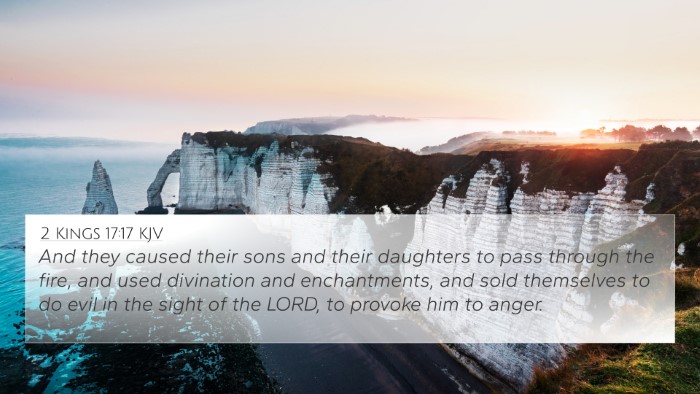 2 Kings 17:17 (KJV) »
2 Kings 17:17 (KJV) »
And they caused their sons and their daughters to pass through the fire, and used divination and enchantments, and sold themselves to do evil in the sight of the LORD, to provoke him to anger.
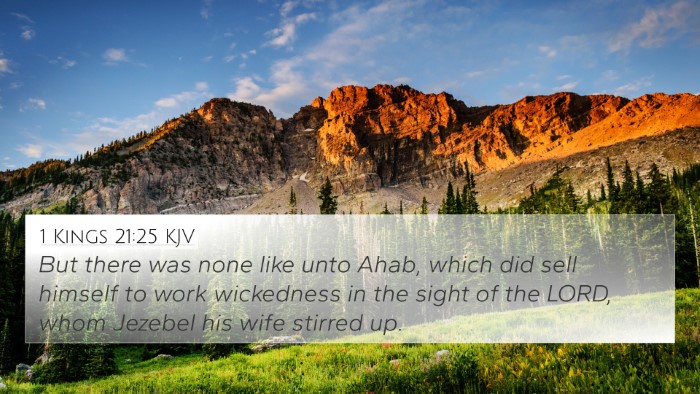 1 Kings 21:25 (KJV) »
1 Kings 21:25 (KJV) »
But there was none like unto Ahab, which did sell himself to work wickedness in the sight of the LORD, whom Jezebel his wife stirred up.
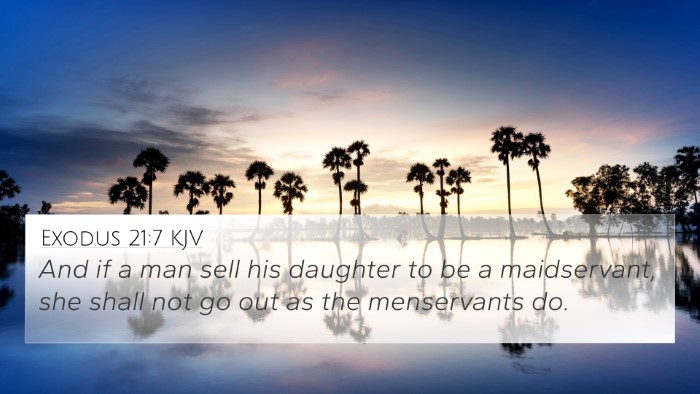 Exodus 21:7 (KJV) »
Exodus 21:7 (KJV) »
And if a man sell his daughter to be a maidservant, she shall not go out as the menservants do.
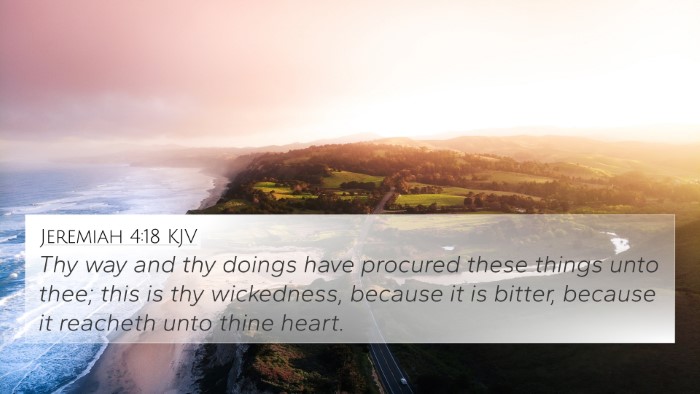 Jeremiah 4:18 (KJV) »
Jeremiah 4:18 (KJV) »
Thy way and thy doings have procured these things unto thee; this is thy wickedness, because it is bitter, because it reacheth unto thine heart.
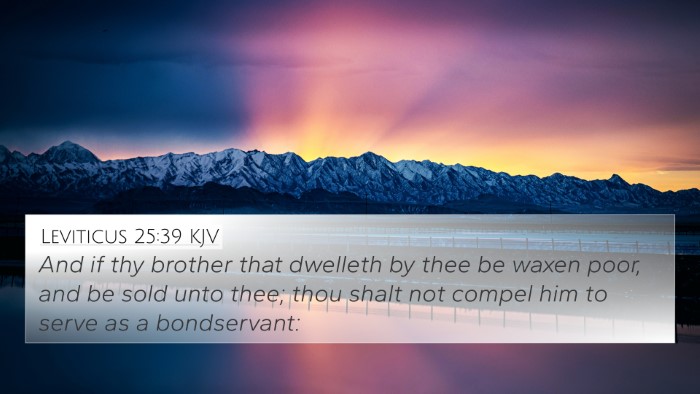 Leviticus 25:39 (KJV) »
Leviticus 25:39 (KJV) »
And if thy brother that dwelleth by thee be waxen poor, and be sold unto thee; thou shalt not compel him to serve as a bondservant:
